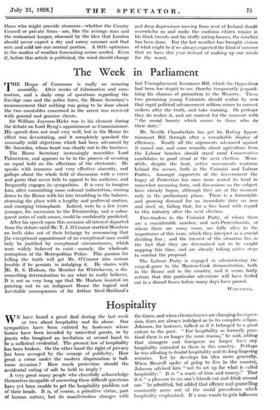The Week in Parliament
THE House of Commons is really an amazing assembly. After weeks of fulmination and com- motion, and a daily. crop of questions regarding the S midge case and the police force, the Home Secretary's announcement that nothing was going to be done about the two constables concerned in the arrest was received with general and genuine cheers.
Sir William Joynson-Hicks was in his element during the debate on Lord Byng's appointment as Commissioner. His speech does not read very well, but in the House its effect was devastating, and it completely quashed the unusually mild objections which had been advanced by Mr. Snowden, whose heart was clearly not in the business.
The Home Secretary increasingly resembles Lord Palmerston, and appears to be in the process of securing an equal hold on the affections of the electorate. He Speaks with immense and very effective sincerity, and gallops about the whole field of discussion with a verve and gusto that never fails to appeal to his audience, and Frequently engages its sympathies. It is easy to imagine him, after committing some colossal indiscretion, coming down to the House with his fate trembling in the balance, storming the place with a lengthy and perfervid oration, and emerging triumphant. Indeed, were he a few years younger, his succession to the Premiership, and a subse- quent series of such scenes, could be confidently predicted.
After his speech upon this occasion all interest departed from the debate until Mr. T. J. O'Connor startled Members on both sides out of their lethargy by announcing that he exceptional appointment of an exceptional man could only be justified by exceptional circumstances, which were widely believed to exist—namely, the wholesale ,corruption of the Metropolitan Police. This passion for ;telling the truth will get Mr. O'Connor into serious ..trouble if he persists in indulging it. He shares with Xi% R. S. Hudson, the Member for Whitehaven, a dis- concerting determination to say what he really believes. It is not so very long ago that Mr. Hudson insisted on pointing out to an indignant House the logical and inevitable consequences of Sir Arthur Steel-Maitland's last Unemployment Insurance Bill, which the Opposition had been too stupid to see, thereby temporarily jeopard- izing his chances of promotion to the Ministry. These two promising young Unionists should realize by now that rapid political advancement seldom comes to earliest seekers after the truth, and take warning. Or perhaps they do realize it, and are content for the moment with " the moral beauty which comes to those who do their duty."
Mr. Neville Chamberlain has got his Rating Appor- tionment Bill through after a remarkable display of efficiency. Nearly all the arguments advanced against it cancel out, and some remarks about agriculture from the Labour benches should stand rural Conservative candidates in good stead at the next election. Mean- while, despite the heat, active movements continue behind the scenes, both in the Unionist and Labour Parties. Amongst supporters of the Government the bogey of Protection has once more reared its head in somewhat menacing form, and discussions on the subject have already begun, although they are at the moment only in the preliminary phase. There is a formidable and growing demand for an immediate duty on iron and steel, or, failing that, for a free hand with regard to this industry after the next election.
Free-traders in the Unionist Party, of whom there are a considerable number, and anti-Protectionists, of whom there are many more, are fully alive to the importance of this issue, which they interpret as a crucial dividing line ; and the interest of the situation lies in the fact that they arc determined not to be caught napping this time, and are already taking active steps to combat the proposal.
The Labour Party is engaged in administering the coup-de-grace to the Maxton-Cook demonstration, both in the House and in the country, and it seems fairly certain that this particular adventure will have fizzled out in a dismal fiasco before many days have passed.
WATCHMAN.




















































 Previous page
Previous page